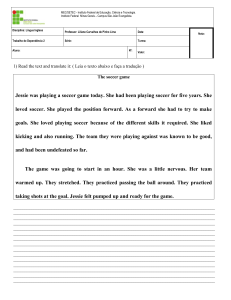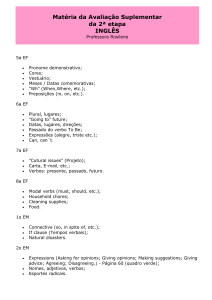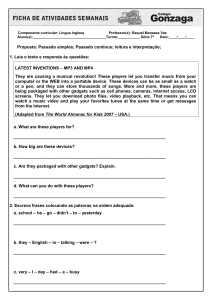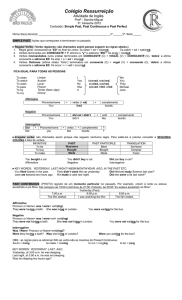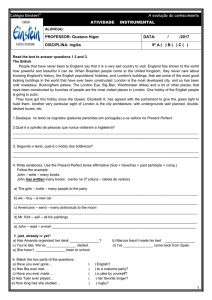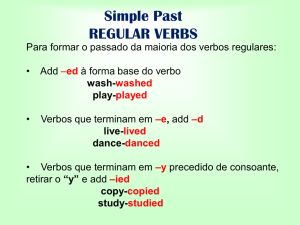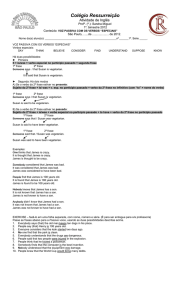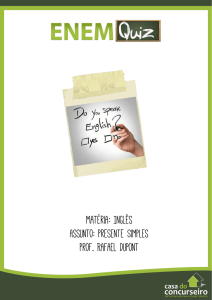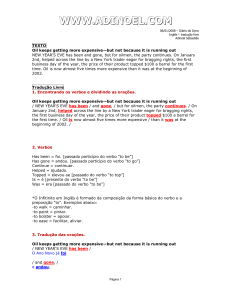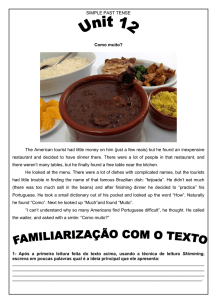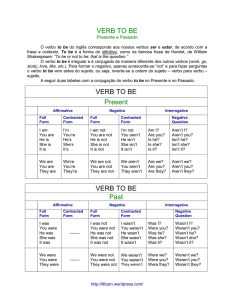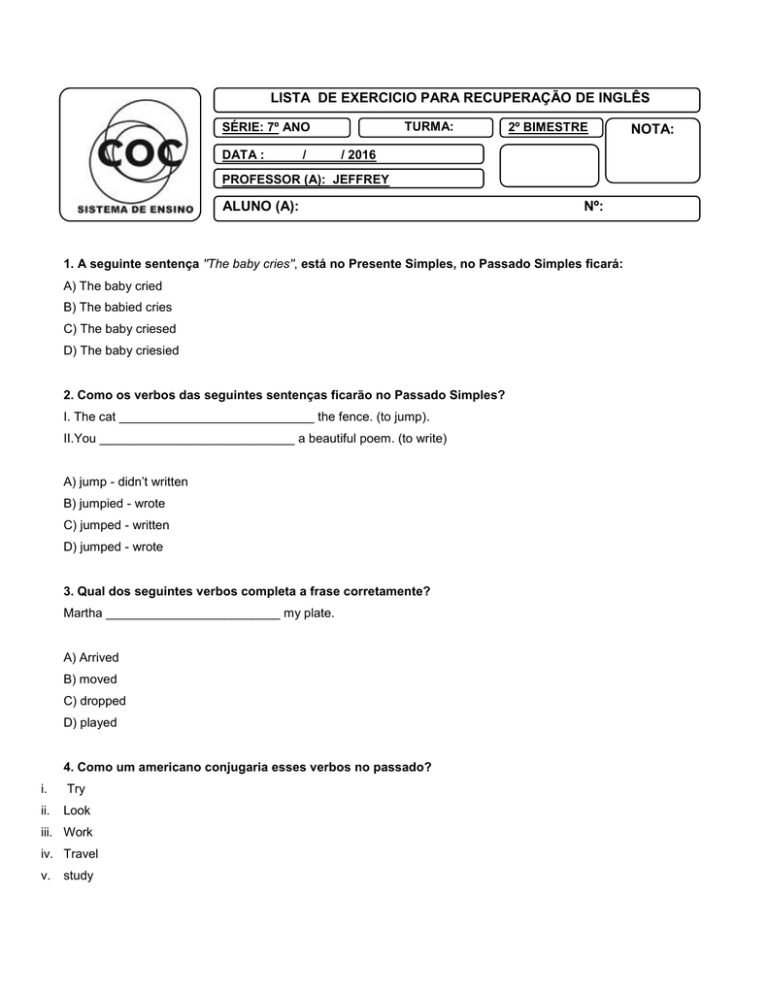
LISTA DE EXERCICIO PARA RECUPERAÇÃO DE INGLÊS
TURMA:
SÉRIE: 7º ANO
DATA :
/
2º BIMESTRE
/ 2016
PROFESSOR (A): JEFFREY
ALUNO (A):
Nº:
1. A seguinte sentença "The baby cries", está no Presente Simples, no Passado Simples ficará:
A) The baby cried
B) The babied cries
C) The baby criesed
D) The baby criesied
2. Como os verbos das seguintes sentenças ficarão no Passado Simples?
I. The cat ____________________________ the fence. (to jump).
II.You ____________________________ a beautiful poem. (to write)
A) jump - didn’t written
B) jumpied - wrote
C) jumped - written
D) jumped - wrote
3. Qual dos seguintes verbos completa a frase corretamente?
Martha _________________________ my plate.
A) Arrived
B) moved
C) dropped
D) played
4. Como um americano conjugaria esses verbos no passado?
i.
Try
ii.
Look
iii. Work
iv. Travel
v.
study
NOTA:
A.
Triet – looked – worket – travelled – studied
B.
Tried – looked – worked – traveled – studied
C.
Tried – lookied – worket – traveled – studied
D.
Triet – looked – worket – travelled – studied
5. A seguinte sentença "You open the windows.", está no Presente Simples, no Passado Simples ficará:
A) You opened the windows.
B) You openned the windows.
C) You oped the windows.
D) You openyed the windows.
6. A seguinte sentença "Sharon visits her aunt", está no Presente Simples, no Passado Simples ficará:
A) Sharon visitsied her aunt
B) Sharon visitsed her aunt
C) Sharon visited her aunt
D) Sharon visitesd her aunt
7. A seguinte sentença "They copy the exercises", está no Presente Simples, no Passado Simples ficará:
A)They copys the exercises
B) They coped the exercises
C) They copyed the exercises
D) They copied the exercises
8. A seguinte sentença "The scientists invent new machines", está no Presente Simples, no Passado
Simples ficará:
A) The scientists invented new machines
B) The scientists invennted new machines
C) The scientists inventted new machines
D) The scientists inventied new machines
9. A seguinte sentença "He is a player soccer", está no Presente Simples, no Passado Simples ficará:
A) He was a player soccer
B) He were a player soccer
C) He ised a player soccer
D) He isn't a player soccer
10. Leia o parágrafo abaixo e assinale a alternativa correta de acordo com os verbos no Simple Past:
I. Yesterday, I go to the restaurant with a client.
II. We drove around the parking lot for 20 minutes in order to find a parking space.
III. When we arrived at the restaurant, the place was full.
a) Nenhuma frase está correta.
b) Todas as frases estão incorretas.
c) As frases I e III estão corretas.
d) As frases II e III estão corretas.
11. Leia a tirinha e marque a afirmativa incorreta:
a) No último balão, a forma afirmativa da segunda frase é: But in my case it was an accident.
b) No segundo quadrinho, o fantasminha deseja saber como a árvore morreu.
c) Died, no primeiro quadrinho, é o passado regular do verbo to die.
d) A forma negativa da frase “I died”, no primeiro quadrinho, é “I didn’t died”.
12. Complete com o simple past dos verbos entre parênteses. Marque a alternativa correta.
Lico _______________________ soccer yesterday. (to play)
A) Lico playied soccer yesterday.
B) Lico played soccer yesterday.
C) Lico playd soccer yesterday.
D) Lico playing soccer yesterday.
13. A seguinte frase na forma negativa:
Susy walked to school yesterday.
A) Susy walked not to school yesterday.
B) Susy didn't walk to school yesterday.
C) Susy not walked to school yesterday.
D) Susy not walk to school yesterday.
14. A seguinte frase na forma interrogativa :
They watched TV.
A.
They watch TV?
B.
They watched TV?
C.
Did they watch TV?
D.
Do they watched TV?
15. “The children .... (to eat) all the food, but they didn’t …. (to drink) the milk” no Simple Past.
A.
eated - drink
B.
Ate - drunk
C.
Ate - drink
D.
Ate - drank
16. Qual é a forma correta do passado dos verbos sublinhados na frase “The boys win the game and
start to to cry”?
A.
Won - started
B.
Winned – start not
C.
Winned - started
D.
Win - starting
17. Complete corretamente no Simple Past a frase: “I … (to go) to Porto Seguro last Summer”
A.
went
B.
goed
C.
was
D.
were
18. Complete corretamente no Simple Past a frase: “__________ your mother __________(to travel) to
Rio last week?”
A.
Did - traveled
B.
Do - travel
C.
Does - travelled
D.
Did - travel
19. Qual o erro da seguinte frase?
They ated (to eat) a hot dog.
A.
Antes do verbo deveria ter didn't
B.
Após o verbo deveria ter didn't
C.
O passado do verbo é ATE
D.
Não há erro na frase
20. Qual é a forma negativa da frase “He studied Biology at UnB”?
a) He not did study Biology at UnB.
b) He didn’t study Biology at UnB.
c) He didn’t studied Biology at UnB.
d) He not studied Biology at UnB
21. Qual é a forma interrogativa da frase “Mario spoke English very well”?
a) Mario speak English very well?
b) Did Mario speak English very well?
c) Mario spoke English very well?
d) Does Mario spoke English very well?
22. Observe as frases abaixo:
I – They arrived at the theater at 9 o’clock.
II – I saw him a year ago.
III – She is my best friend.
IV – Mary slept 12 hours yesterday.
Quantas frases estão no Simple Past?
a) quatro
b) três
c) duas
d) uma
23. Qual é o passado do verbo to get?
a) getted
b) gotied
c) geted
d) got
24. Qual é o passado do verbo to sleep?
a) slept
b) sleeped
c) sleepped
d) slepted
25. Qual é o passado do verbo to have?
a) had
b) haved
c) havied
d) haded
26. Qual é o passado do verbo to meet?
a) metted
b) meted
c) meeted
d) met
27. Qual é o passado do verbo to find?
a) findded
b) finded
c) found
d) foundie
28. Qual é o passado do verbo to break?
a) breaken
b) broke
c) brokened
d) breaked
29. Qual é o passado do verbo to see?
a) sew
b) saw
c) seed
d) sed
30. Qual é o passado do verbo to think?
a) though
b) thinked
c) thought
d) thinkked
31. Qual é o passado do verbo to drive?
a) drivved
b) drived
c) droved
d) drove
32. Qual é o passado do verbo to take?
a) took
b) toked
c) tooken
d) taking
33. Como a frase “I think she drives madly and keeps having accidents” ficará no Simple Past.
a) I thought she drove madly and kept having accidents.
b) I thought she drived madly and kept having accidents.
c) I thinked she drived madly and keeped having accidents.
d) I thought she drove madly and keeped having accidents.
34. De acordo com o estudo do Simple Past, quantos verbos regulares estão destacados na frase “He
stopped at the traffic lights, waited and began to drive through the main road”?
a) nenhum.
b) um.
c) três
d) dois
35. When ________ World War II ________ ?
a) did ... started
b) do ... started
c) did ... start
d) do ... start
e) does start
36. Qual o nome desse hobby em inglês?
a) Skiing
b) Swimming
c) Fishing
d) Windsurfing
37. Qual o nome desse interest em inglês?
a) cycling
b) dancing
c) reading
d) computer games
38. Qual o nome dos hobbies listados abaixo em inglês?
a) Watching TV - Basketball- Soccer - Swimming
b) Watching TV - Basktball- Football- Fishing
c) Watching TV - Volleyball - Soccer - Fishing
d) Watching TV - Volleyball - Football- Swimming
39. Qual é a resposta correta para a pergunta: “Did they like it?”?
a) Yes, you did.
b) No, they like not.
c) No, I didn’t.
d) Yes, they did.
40. Qual o nome desse hobby em inglês?
a) cycling
b) biking
c) riding
d) flying
41. Qual o nome do hobby da imagem?
A) windsurfing
B) fishing
C) swimming
D) skiing
42. Qual dos seguintes verbos completa a frase corretamente?
We ... at the party at 8:00.
A) played
B) moved
C) dropped
D) arrived
43. Qual dos seguintes verbos completa a frase corretamente?
Suki ... school last year..
A) played
B) moved
C) started
D) arrived
44. Qual dos seguintes verbos completa a frase corretamente?
Chico … to Spain last month.
A) played
B) moved
C) started
D) arrived
44. Qual dos seguintes verbos completa a frase corretamente?
They .... tennis for hours.
A) moved
B) played
C) started
D) arrived
Leia o texto e responda as próximas 3 questões:
Dear José,
How are you? How is your family? Are you still working on the farm?
I am working very hard. Last week I went to Canada. I worked there. But I also had a wonderful time. On
Saturday, I woke up at 9 a.m. Then I caught a bus to see the city. Toronto is very beautiful. I saw many shops.
Some shops sold clothes, some sold alarm clocks, and some sold flowers. After some time, I bought a
sandwich. I had a loto of fun. Guess what? I went to the movies and I watched Central do Brasil. It is a great
film. At 8 p.m. I went back to the hotel. On Monday, I took a plane and returned to my city.
Goodbye now. Hope to hear from you soon. Maybe I will go back to Minas in December.
Your friend, Bob.
45. Where did Bob go last week?
a) He went to a farm in Minas.
b) He went to a city in Minas.
c) He went to a farm in Canada.
d) He went to a city in Canada.
46. How did Bob go from the hotel to the city?
a) He had a good time.
b) Because he went to the movies.
c) He went by bus.
d) He went by plane.
47. What did Bob do on Saturday?
a) He went to the movies.
b) He worked on the farm.
c) He visited Minas.
d) He took a plane to his city.
48. Tell me, why _______ you so angry?
a) were
b) was
c) did be
d) did were
49. Os verbos: build – keep – teach no passado:
a) built – keeped - teached
b) build – keeped - taught
c) builded – kept - teach
d) built – kept – taught
50. The child __________________ milk last night.
a) wrote
b) read
c) drank
d) ate

